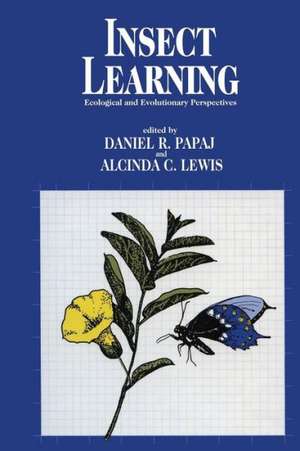Insect Learning: Ecology and Evolutinary Perspectives
Editat de Daniel R. Papaj, Alcinda C. Lewisen Limba Engleză Paperback – 20 oct 2012
Insect Learning covers both social and non-social insects from multiple perspectives. The book covers mechanisms; syntheses of work on physiology, behavior, and ecology; and micro- and macroevolution. The concluding section discusses future directions for research, including applications to pest management.
| Toate formatele și edițiile | Preț | Express |
|---|---|---|
| Paperback (1) | 1222.49 lei 6-8 săpt. | |
| Springer Us – 20 oct 2012 | 1222.49 lei 6-8 săpt. | |
| Hardback (1) | 1232.26 lei 6-8 săpt. | |
| Springer Us – 30 dec 1992 | 1232.26 lei 6-8 săpt. |
Preț: 1222.49 lei
Preț vechi: 1490.84 lei
-18% Nou
Puncte Express: 1834
Preț estimativ în valută:
233.93€ • 244.73$ • 194.32£
233.93€ • 244.73$ • 194.32£
Carte tipărită la comandă
Livrare economică 02-16 aprilie
Preluare comenzi: 021 569.72.76
Specificații
ISBN-13: 9781461362166
ISBN-10: 1461362164
Pagini: 416
Ilustrații: XIII, 398 p.
Dimensiuni: 155 x 235 x 22 mm
Greutate: 0.58 kg
Ediția:Softcover reprint of the original 1st ed. 1993
Editura: Springer Us
Colecția Springer
Locul publicării:New York, NY, United States
ISBN-10: 1461362164
Pagini: 416
Ilustrații: XIII, 398 p.
Dimensiuni: 155 x 235 x 22 mm
Greutate: 0.58 kg
Ediția:Softcover reprint of the original 1st ed. 1993
Editura: Springer Us
Colecția Springer
Locul publicării:New York, NY, United States
Public țintă
ResearchDescriere
Insect Learning is a comprehensive review of a new field. Until recently, insects were viewed as rigidly programmed automatons; now, however, it is recognized that they can learn and that their behavior is plastic. This fundamental change in viewpoint is causing a re-examination of all aspects of the relationship between insects and their environment. This change in perspective is occurring at a time of heightened interest in brain function in both vertebrates and invertebrates. Insects potentially play a major role in this expanding area. Because of their experimental tractability and genetic diversity, they provide unique opportunities for testing hypotheses on the ecology and evolution of learning. As organisms of economic importance, they are perennial objects of research by both basic and applied scientists.
Insect Learning covers both social and non-social insects from multiple perspectives. The book covers mechanisms; syntheses of work on physiology, behavior, and ecology; and micro- and macroevolution. The concluding section discusses future directions for research, including applications to pest management.
Insect Learning covers both social and non-social insects from multiple perspectives. The book covers mechanisms; syntheses of work on physiology, behavior, and ecology; and micro- and macroevolution. The concluding section discusses future directions for research, including applications to pest management.
Cuprins
Contributors; Preface; D.R. Papaj, Alcinda C. Lewis. Aversion learning and feeding; E.A. Bernays. Ethological and comparative perspectives on honey bee learning; J.L. Gould. Learning of host-finding cues by hymenopterous parasitoids; T.C.J. Turlings, F.L. Wackers, L.E.M. Vet, W.J. Lewis, J.H. Tumlinson. Functional organization of appetitive learning and memory in a generalist pollinator, the honey bee; R. Menzel, U. Greggers, M. Hammer. Merging mechanism and adaptation: an ethological approach to learning and generalization; B.H. Smith. Motivation, learning and motivated learning; M. Mangel. Choosing hosts and mates: the value of learning; B.D. Roitberg, M.L. Reid, Chao Li. Learning and behavioral ecology: incomplete information and environmental predictability; D. Stephens. Learning and the evolution of resources: pollinators and flower morphology; A.C. Lewis. Automatic behavior and the evolution of instinct: lessons from learning in parasitoids; D.R. Papaj. Comparative and experimental approaches to understanding insect learning; J.A. Rosenheim. Application of learning to pest management; R.J. Prokopy, W.J. Lewis. Cognition in bees: from stimulus reception to behavioral change; R. Dukas, L.A. Real. Afterword: Learning, adaptation and the lessons of O; D.R. Papaj. Index.
Recenzii
`Insect Learning is a collection of papers providing an extensive and indepth look at the functional ecology of insect learning. On the whole this book is a good balance of theory, models and empirical results which underline the significance of various types, and aspects of learning in insect decision-making. ... an original product that will undoubtedly stimulate fruitful discussion and create further avenues of research.... I recommend Insect Learning. It is a most stimulating book and a key reference. In my estimation it has no rival.'
Bulletin of Entomological Research
`This book reviews a broad range of ecological and evolutionary problems in insect learning, usually in the context of new data and original models.'
Review of Medical and Veterinary Entomology
`We can expect to see much progress in this field over the coming decade, and this book points the way.'
Ecology
`The excellent chapter by Rosenheim should be required reading for all who work in the area of insect learning... this book is a welcome addition to the literature on insect behaviour ...a well-organized and generally well-written book that should be read by anyone interested in insect behavior.'
Annals of the Entomological Society of America
Bulletin of Entomological Research
`This book reviews a broad range of ecological and evolutionary problems in insect learning, usually in the context of new data and original models.'
Review of Medical and Veterinary Entomology
`We can expect to see much progress in this field over the coming decade, and this book points the way.'
Ecology
`The excellent chapter by Rosenheim should be required reading for all who work in the area of insect learning... this book is a welcome addition to the literature on insect behaviour ...a well-organized and generally well-written book that should be read by anyone interested in insect behavior.'
Annals of the Entomological Society of America













